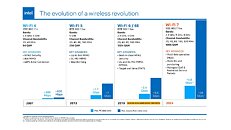TheLostSwede
News Editor
- Joined
- Nov 11, 2004
- Messages
- 17,771 (2.42/day)
- Location
- Sweden
| System Name | Overlord Mk MLI |
|---|---|
| Processor | AMD Ryzen 7 7800X3D |
| Motherboard | Gigabyte X670E Aorus Master |
| Cooling | Noctua NH-D15 SE with offsets |
| Memory | 32GB Team T-Create Expert DDR5 6000 MHz @ CL30-34-34-68 |
| Video Card(s) | Gainward GeForce RTX 4080 Phantom GS |
| Storage | 1TB Solidigm P44 Pro, 2 TB Corsair MP600 Pro, 2TB Kingston KC3000 |
| Display(s) | Acer XV272K LVbmiipruzx 4K@160Hz |
| Case | Fractal Design Torrent Compact |
| Audio Device(s) | Corsair Virtuoso SE |
| Power Supply | be quiet! Pure Power 12 M 850 W |
| Mouse | Logitech G502 Lightspeed |
| Keyboard | Corsair K70 Max |
| Software | Windows 10 Pro |
| Benchmark Scores | https://valid.x86.fr/yfsd9w |
Although Intel threw in the towel and gave up on making routers and gateways back in 2020, the company is still the world's largest manufacturer of WiFi modules for computers. Now news out of Korea suggests that Intel's first WiFi 7 products will be launched in 2024, about a year after the expected availability of the first WiFi 7 routers and gateways. That said, based on a quote from Eric McLaughlin, vice president of Intel's wireless solutions division, who attended an unspecified press conference in the APAC region, Intel "expect it to appear in major markets in 2025." This suggests that it'll be a late 2024 launch and we might see competitors' products in notebooks and PCs way ahead of Intel this time around.
That said, the WiFi 7 standard is currently only in the late stages of development, despite Broadcom, MediaTek and Qualcomm having announced multiple products already. It's likely we'll see another round of draft spec hardware launching either later this year, or next year, with the final WiFi 7 spec not expected to be ratified until 2024. As such, Intel may be later than its competitors, but should hopefully launch a feature complete product. Intel's products should support speeds of up to 5.8 GHz, although this would be using a 320 MHz wide channel and 4K QAM, which means these speeds will be limited to a few meters from a router. WiFi devices have a history of quirky issues between brands, even if none of them have been so severe that a fallback to an older standard hasn't solved the problem, but it's still been a hassle for consumers. Hopefully WiFi 7 won't repeat history, but we wouldn't place a bet on it.

View at TechPowerUp Main Site | Source
That said, the WiFi 7 standard is currently only in the late stages of development, despite Broadcom, MediaTek and Qualcomm having announced multiple products already. It's likely we'll see another round of draft spec hardware launching either later this year, or next year, with the final WiFi 7 spec not expected to be ratified until 2024. As such, Intel may be later than its competitors, but should hopefully launch a feature complete product. Intel's products should support speeds of up to 5.8 GHz, although this would be using a 320 MHz wide channel and 4K QAM, which means these speeds will be limited to a few meters from a router. WiFi devices have a history of quirky issues between brands, even if none of them have been so severe that a fallback to an older standard hasn't solved the problem, but it's still been a hassle for consumers. Hopefully WiFi 7 won't repeat history, but we wouldn't place a bet on it.

View at TechPowerUp Main Site | Source




